
 Declan Schroeder
The Hockey Writers
Declan Schroeder
The Hockey Writers
27
Reads
0
Comments
Bobby Hull – The Golden Jet
He dominated two different professional leagues for more than two decades. He won three Art Ross Trophies, two Hart Memorial Trophies, two Avco Cups, a Lady Byng Trophy, and a Stanley Cup. He was an NHL first All-Star 10 times and a World Hockey Association All-Star thrice.
He’s Bobby Hull. He’s “The Golden Jet.” He’s without a doubt, one of the greatest hockey players of all time.
Hull’s Beastly Black Hawks Career for More Than a Decade
Hull joined the Chicago Black Hawks (yes, there was a space in the name at the time) at 18-years-old after two seasons with the Ontario Hockey Association’s St. Catharines Teepees.
The platinum-blond haired left-winger quickly revitalized a failing franchise that had missed the playoffs in 11 out of their last 12 seasons and put the league on notice with his explosive speed and scintillating shot, hence his nickname. In 1959-60, he captured his first major award, putting up 81 points and winning the Art Ross Trophy.
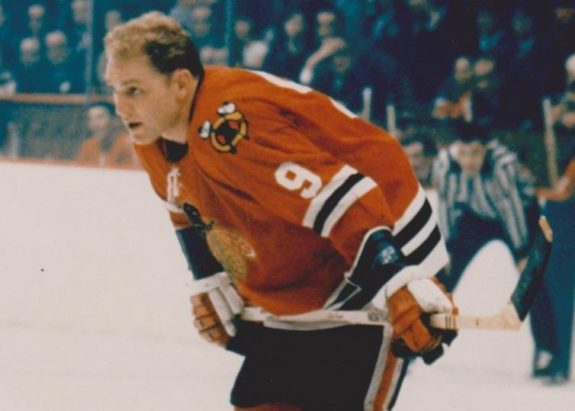
Within four seasons of his arrival, the perennial bottom-feeding Black Hawks were the league’s top dog. In 1961, they hoisted the Stanley Cup after knocking off the Detroit Red Wings four games to two; Hull recorded four goals and 10 assists in 12 playoff games.
Hull’s first 50-goal campaign — the first of five — and his first Art Ross came in 1961-62. In 1964-65, he won the Hart for the second time and a Lady Byng as the Black Hawks reached the Cup Final again, but were bested by the Montreal Canadiens in seven games.
Related: Chicago Blackhawks 50-Goal Scorers
That same year, his younger brother Dennis — aptly nicknamed “The Silver Jet” — joined the squad and the two were teammates for eight campaigns.
Hull set history the following season and set a modern-day goal scoring record by lighting the lamp 54 times the following season. He scored his record-setting 51st — surpassing the previous record set by Maurice Richard, Bernie Geoffrion, and himself — on March 12 in front of 16,666 rabid Black Hawks fans at 5:34 of the third period.
Hull ended the year with 54 and another Hart Trophy.
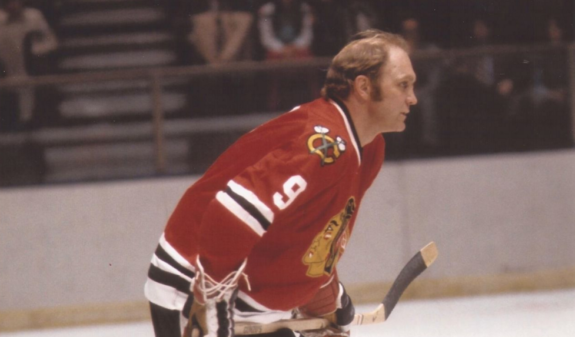
Hull continued putting up piles of points through the rest of the 1960s and into the 1970s. He scored 50-plus goals three more times and posted more than a point per game in each of the six seasons between 1966-67 and 1971-72. He put up an eye-popping 107 points in 1968-69, 96 in 1970-71, and 93 in 1971-72.
The Golden Jet Becomes a Jet
By the end of the 1972 season, Hull was 33 years old and had recorded 604 goals and 549 assists for 1153 points in 1036 games over 15 seasons.
Related: Blackhawks with 100-Point Seasons
However, he felt as a perennial superstar that he was underpaid. At the same time, the upstart World Hockey Association — which hoped to directly compete with the NHL and attract stars from the league by offering them bigger bucks — appeared on the scene.
Hull had previously joked he’d jump to a WHA team if they gave him $1 million up front. Ben Hatskin, the owner of the Winnipeg Jets, was happy enough to do just that. In a dramatic press conference in front of thousands at the city’s iconic Portage and Main intersection, Hatstkin announced Hull would be joining his new squad on a $2.75 million, 10 year contract. He even presented the now-former NHLer with a giant cheque representing a $1 million signing bonus.
The move gave the WHA instant credibility and Hull a new home to show his still-superb skills.
Hull Reaches New Heights in WHA, Lights it Up on “Hot Line”
In the Jets’ inaugural season, Hull racked up 51 goals and 52 assists for 103 points in just 63 games. The Jets reached the Avco Cup Final but fell to the Hartford Whalers.
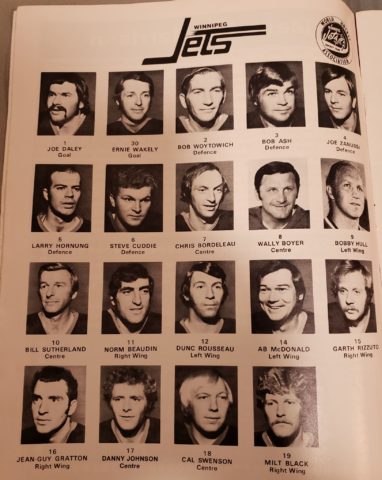
Just like he was in the NHL, Hull was one of the WHA’s most dangerous forwards, and became even more so upon the arrival of a pair of superb Swedes.
Between 1974-75 and 1977-78, Hull played on “The Hot Line” alongside Anders Hedberg and Ulf Nilsson. The terrific trio lit up their opposition night after night and amassed a combined 573 goals and 1,377 points in just 855 games. Hedberg, Hull, and Nilsson each recorded at least 100 points a piece each season they were together, except for Hull in 1976-77, when he only played 34 games due to injury.
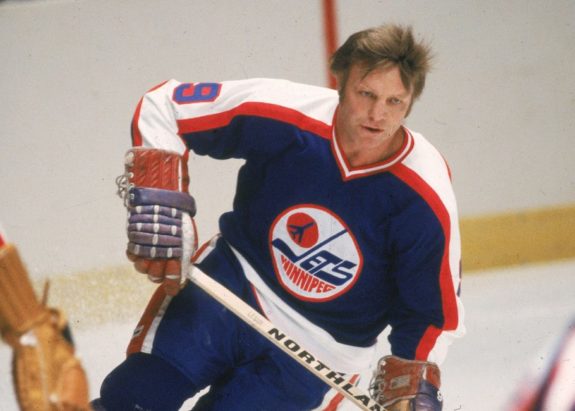
Indeed, in addition his 103-point 1972-73 campaign, Hull reached triple digits three other times. He raked in 142 in 78 games in 1974-75 (an average of 1.82 per contest!) 123 in 1975-76, and 117 in 1977-78. In both 1976 and 1978, Hull and the Jets captured Avco Cup Glory.
Winding Things Down Back in the NHL
Prior to the 1978-79 season — the final one prior to the WHA-NHL merger — Hedberg and Nilsson were traded to the New York Rangers and there was much speculation regarding who Hull’s new line mates were going to be. It turned out to be a moot point as Hull, then 40, played only four games all season due to injury. Even sans Hull, the Jets won their third Avco Cup, conquering the Edmonton Oilers in six games.
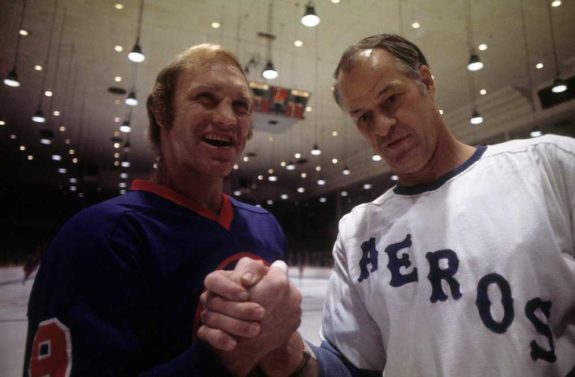
In 1980, Hull found himself back in the league he once spurned, but his career was winding down. He suited up for 18 games and recorded 10 points in the Jets’ first go-around as an NHL club before being traded to the Hartford Whalers and playing nine regular season and three playoff games there.
In 1981, he attempted to make a comeback with the New York Rangers and played in five exhibition games before he and the club mutually decided to end the experiment.
Hull is Hockey Royalty, But Controversies Complicate His Legacy
Hull’s career numbers are outrageous. By the time he hung up his skates, he’d recorded 610 goals and 560 assists for 1,170 points in 1,063 NHL games and scoring 303 goals and 335 assists for 638 points in 411 WHA games. He is 18th all-time in NHL goals scored and second all-time in WHA goals scored.
He is first all-time on the Blackhawks in goals and second in points to this day and will forever be the leading goal-scorer and points-getter for the WHA Jets by a wide margin.
There’s no questioning the Hulls as a bona-fide hockey family, either. In addition to Dennis — a five-time All-Star himself — Bobby’s son Brett became arguably a bigger star than his father, recording 741 goals and 650 assists for 1,391 points in a 19-year career.
Related: Top 5 Father-Son Duos in NHL History
In 1978, Hull was made an Officer of the Order of Canada. In 1983, the Blackhawks retired his #9; that same year, he was inducted into the Hockey Hall of Fame. In 2016-17, he was part of the Winnipeg Jets’ Hockey Hall of Fame’s inaugural class.
Some controversies and less-than-savoury behaviours sully his legacy, however. In 1998, he allegedly made some pro-Nazi comments to a Moscow newspaper.
Prior to that, his second marriage —to figure skater Joanne McKay — ended in divorce due to a number of abusive incidents. Hull’s third wife, Deborah, also accused him of assault and battery, although she later dropped the charges. For these reasons, some believe the NHL should distance themselves from the former star.
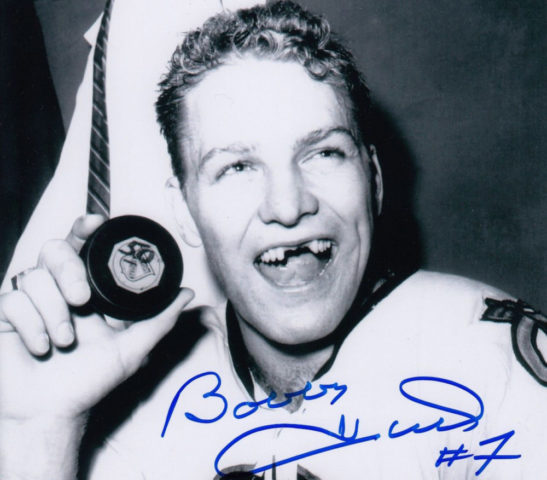
However you feel about Hull as a person, what “The Golden Jet” did on the ice and as an ambassador for hockey in general cannot be understated. However, to fully appreciate his storied career, it’s necessary to separate the art from the artist.
The post Bobby Hull – The Golden Jet appeared first on The Hockey Writers.
Popular Articles

















































 Blackhawks Chicago
Blackhawks Chicago Panthers Florida
Panthers Florida Penguins Pittsburgh
Penguins Pittsburgh Rangers New York
Rangers New York Avalanche Colorado
Avalanche Colorado Kings Los Angeles
Kings Los Angeles Maple Leafs Toronto
Maple Leafs Toronto Bruins Boston
Bruins Boston Capitals Washington
Capitals Washington Flames Calgary
Flames Calgary Oilers Edmonton
Oilers Edmonton Golden Knights Vegas
Golden Knights Vegas Flyers Philadelphia
Flyers Philadelphia Senators Ottawa
Senators Ottawa Lightning Tampa Bay
Lightning Tampa Bay Red Wings Detroit
Red Wings Detroit Islanders New York
Islanders New York Sabres Buffalo
Sabres Buffalo Devils New Jersey
Devils New Jersey Hurricanes Carolina
Hurricanes Carolina Stars Dallas
Stars Dallas Jets Winnipeg
Jets Winnipeg Blue Jackets Columbus
Blue Jackets Columbus Predators Nashville
Predators Nashville Wild Minnesota
Wild Minnesota Blues St. Louis
Blues St. Louis Mammoth Utah
Mammoth Utah Ducks Anaheim
Ducks Anaheim Sharks San Jose
Sharks San Jose Canucks Vancouver
Canucks Vancouver






